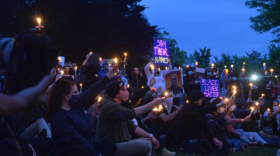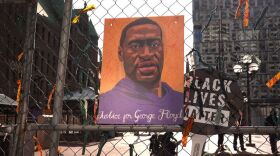Former Minneapolis police officer Derek Chauvin has been found guilty on three counts in the murder of George Floyd. Here in New Hampshire, community organizers have been fighting for racial justice and police accountablity since Floyd's death.
NHPR's Morning Edition host Rick Ganley spoke with one of those organizers, Grace Kindeke, about what this moment means for her.
Sign up for NHPR's newsletter for more New Hampshire news and information.
Rick Ganley: Can you tell me what was your reaction when you first heard about the news of Chauvin's conviction?
Grace Kindeke: So my reaction was mixed. I was lucky enough to be in a meeting with other activists for an intimate abolition circle discussion group that we have monthly, and we were able to share in our reactions because we were watching the verdict be read live. And so my reaction was really first, elation that we have the very public and very clear message that, yes, what we all saw in that nine-minute video was was real, was true, that this man is guilty of committing murder. And yet at the same time, there is a bittersweet nature to it because, you know, the prison system, the criminal justice system isn't necessarily the answer to our problems. And so I can't celebrate a man necessarily going to prison because of the harm that prisons do. But I did celebrate the fact that finally America showed the world that, yes, we can find a white man guilty for murdering a black person and being caught on camera doing so.
Rick Ganley: So at this moment, there is some accountability for what happened to George Floyd. But do you believe this is justice served?
Grace Kindeke: No, I don't. You know, this is a start in the process of accountability, but real justice would be George Floyd still being alive. Real justice would be Breonna Taylor still being alive. Real justice would have been 16-year-old Ma'Khia Bryant not being shot in mere hours after the verdict was read. So even though this was a long time coming, and there is such meaning and importance in having our own systems be able to say when people are guilty, it is not enough. It doesn't truly put us onto the path of healing, but it does mean something. But it's not full justice.
Rick Ganley: Systemic racism and police violence are issues here in New Hampshire, like anywhere else. What do you hope comes now for our state?
Grace Kindeke: I hope that this is a wake up call for many folks. I know that the events of George Floyd's murder, with Breonna Taylor's murder, with the many murders countless other folks in between, that a lot of people have woken up to the realities of racism and systemic racism in our country. But I think here in New Hampshire, we are still sliding backwards. Because even in the state budget right now, we have a state budget making its way through that claims that is trying to prohibit even being able to talk about racism, systemic racism, and is trying to claim that the mere mention or discussion on racism is racist. And considering what we've seen, what many of us, especially people of color experience, I mean, it's mind boggling that we would even be discussing and trying to argue what is racist when we know and see clearly everything that systemic racism is.
"I think here in New Hampshire, we are still sliding backwards."
Rick Ganley: I would ask you about that. Why do you believe there is so much support among lawmakers for that legislation?
Grace Kindeke: You know, I think it's twofold. I think part of it is willful ignorance. I think that white supremacy and racism in the country looks and expresses itself in many different ways. And one of those ways is through denial and gaslighting by claiming that racism isn't real, that white people experience racism simply by being called white. And it doesn't really get to the heart of the matter. It's a really great distraction technique when you're looking at incredibly high disparities in access to education, access to health care, especially as what the pandemic has revealed to us. And it's much easier to say that, oh, the problems are in that people are bringing up these issues and shining a light on them, rather than the fact that racism, systemic racism, the outcomes of that systemic racism is incredible disparities in health and access to resources that impact people's lives, and shorten and harm them.
Rick Ganley: At a local Black Lives Matter vigil in Manchester over the weekend where you spoke, many expressed exhaustion and frustration with the lack of progress made by the state, and frankly, the lack of progress made by white people who were attending George Floyd protests a year ago now. Looking forward, what is really showing up look like to you? What does that mean?
Grace Kindeke: I think showing up looks many different ways. There's a place for us all to be contributing to, you know, what is the true American democratic experiment, which is a multiracial and a multicultural democracy. So there are spaces for folks to show up and raise their voices to their lawmakers, writing letters to their editor, to the local newspapers. There are ways for people to show up and support their local communities, their local Black Lives Matter chapters, the other local racial organizations, to join give your time, give your energy to them. And I think there's also so much space to be had for just being able to have these conversations wherever we are with our neighbors, with our grocery clerks, with our family, our friends, our postmen, our postwomen. We think it's very vitally important that white allies do the work of becoming white accomplices, because the systemic racism, the system of white supremacy absolutely harms black and brown communities. But it also harms white communities.
And we cannot be a true democracy if we're not willing to to show up for one another, give our time, give our energy, as well as being able to do that work internally and do that work within our communities and families in order to realize that in order for us to be a true democracy, we must do the hard work of dismantling systemic racism. And seeing how it shows up in the ways that we structure our systems where our money goes. If we are willing to spend more money on law enforcement, but we're looking at cuts into the Department of Health and Human Services, looking at cuts in our education, it's clear that we are staying with our money, but where our values lie. So I think there are plenty of opportunities for people to engage and we need one another. We need our folks to engage with this so that we can do the work of dismantling the system.








